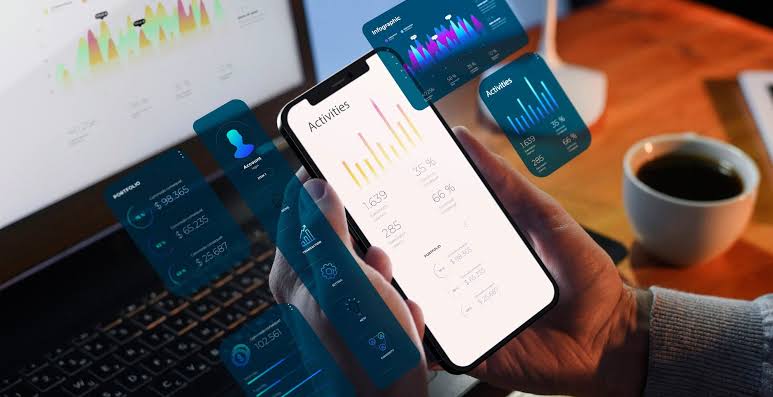
How Fintech Apps Are Revolutionizing the Way We Handle Money
Fintech apps are rapidly reshaping how we interact with money—making transactions faster, investing simpler, and financial management smarter. By leveraging digital technology, these apps bring convenience, accessibility, and financial inclusion to millions. From personal budgeting to small business solutions, the fintech revolution is breaking barriers set by traditional banking.
✨ Raghav Jain

Introduction
Gone are the days of long queues at banks, paper-heavy transactions, and limited control over personal finances. In today’s digital age, Fintech (Financial Technology) apps have transformed the way we spend, save, invest, borrow, and manage money. From digital wallets and investment platforms to personal finance trackers, fintech apps are putting financial power directly into your pocket—fast, secure, and user-friendly.
This revolution is not just about convenience—it’s about financial inclusion, transparency, personalization, and empowerment. Whether you're a student learning to budget, a small business owner tracking expenses, or an investor growing your wealth—there’s a fintech app designed just for you.
Let’s dive into how fintech apps are changing our relationship with money, the tech behind it, the benefits they offer, and how you can start using them smartly in your everyday life. Fintech apps are fundamentally reshaping the way individuals and businesses manage their money, ushering in an era of unprecedented accessibility, convenience, and control over financial affairs. This revolution is driven by the seamless integration of technology, particularly mobile technology, with traditional financial services, resulting in a user-centric ecosystem that empowers individuals to take charge of their financial well-being. At its core, fintech addresses the shortcomings of conventional banking by offering faster, more efficient, and often more affordable alternatives for everything from daily spending to long-term investing.
One of the most significant impacts of fintech apps is the democratization of financial services. Historically, many banking and investment opportunities were inaccessible to underserved populations, whether due to geographical barriers, high fees, or stringent credit requirements. Fintech apps have dramatically lowered these entry barriers. Mobile-first digital banks, or "neobanks" like Chime and N26, operate entirely online, eliminating the need for physical branches and reducing overheads, which translates to lower or even no fees for users. This has opened up banking to millions who were previously unbanked or underbanked, providing essential services like direct deposit, savings accounts, and even early access to paychecks. Furthermore, microfinance platforms and alternative lending solutions are leveraging technology to assess creditworthiness using non-traditional data, thereby providing access to loans for small businesses and individuals with limited credit histories.
Beyond basic banking, fintech apps are revolutionizing personal finance management (PFM). Tools like Mint and YNAB (You Need A Budget) offer comprehensive dashboards that aggregate all of a user's financial accounts – checking, savings, credit cards, investments – into a single, cohesive view. This eliminates the fragmented experience of logging into multiple bank websites and provides a holistic understanding of one's financial standing. These apps often incorporate sophisticated budgeting features, allowing users to categorize expenses automatically, set spending limits, and receive real-time alerts on their financial activity. Many employ behavioral economics principles, such as "round-up" features that automatically invest spare change from transactions (e.g., Acorns), making saving and investing feel effortless and even gamified. This proactive, data-driven approach encourages better financial habits, helping users identify areas of overspending, track progress towards savings goals, and build long-term financial stability.
Investment has also been profoundly transformed by fintech. Platforms like Robinhood and Stash have democratized access to the stock market, allowing individuals to invest with minimal amounts and often without commission fees. Robo-advisors, such as Betterment, utilize algorithms to create and manage diversified investment portfolios tailored to a user's risk tolerance and financial goals, making wealth management accessible to a broader audience than traditional financial advisors typically serve. The rise of cryptocurrency exchanges like Coinbase has further expanded investment horizons, enabling users to easily buy, sell, and manage digital assets. These apps provide educational resources, real-time market data, and simplified interfaces, empowering even novice investors to participate in global markets.
Payment systems have undergone a radical transformation as well. Peer-to-peer (P2P) payment apps like Venmo and Cash App have made splitting bills and sending money to friends and family as simple as a few taps on a smartphone, often with social integration that adds a new dimension to financial interactions. The ubiquity of QR code payments and mobile wallets means that physical cash and cards are becoming less necessary for everyday transactions. Furthermore, "Buy Now, Pay Later" (BNPL) services offered by companies like Klarna have emerged as popular alternatives to traditional credit, allowing consumers to spread out payments for purchases without interest, subject to specific terms. These innovations enhance convenience and flexibility in consumer spending.
Underpinning these advancements is the extensive use of cutting-edge technologies. Artificial intelligence (AI) and machine learning (ML) are central to fintech apps, enabling personalized financial advice, fraud detection, and predictive analytics. AI-powered chatbots provide 24/7 customer support, while algorithms analyze spending patterns to offer tailored recommendations for saving or investing. Blockchain technology, initially popularized by cryptocurrencies, is also being explored for its potential to enhance security, transparency, and efficiency in transactions and record-keeping across various financial services. Open banking initiatives further amplify the power of fintech apps by allowing secure data sharing between different financial institutions with user consent, providing a truly unified view of a user's financial life across multiple accounts and providers.
However, this revolution is not without its challenges. Data security and privacy remain paramount concerns, as fintech apps collect highly sensitive financial information. Robust encryption, multi-factor authentication, and strict regulatory compliance are crucial for building and maintaining user trust. Algorithmic bias in lending models, which could inadvertently perpetuate financial inequality, also requires careful oversight. Moreover, while fintech apps offer immense convenience, over-reliance on automation without sufficient understanding of financial principles can lead to poor decision-making or a lack of engagement with one's finances. The regulatory landscape is also constantly playing catch-up with the rapid pace of fintech innovation, necessitating adaptive frameworks to protect consumers and ensure fair competition.
In essence, fintech apps are not just tools; they are powerful disruptors that have redefined the relationship between individuals and their money. By prioritizing user experience, leveraging advanced technology, and focusing on accessibility, they have transformed finance from a complex, often intimidating domain into an intuitive, empowering, and deeply integrated part of daily life. As these apps continue to evolve, driven by further technological advancements and shifting consumer expectations, they promise to further streamline financial operations, enhance financial literacy, and drive greater inclusion across the globe, solidifying their role as indispensable components of modern money management.
What Are Fintech Apps?
Fintech apps combine finance + technology to make financial services faster, cheaper, and more accessible. They include:
- Digital wallets (like Google Pay, PhonePe, Paytm)
- UPI-based banking
- Expense trackers (like Walnut, Money Manager)
- Micro-investing platforms (like Groww, Zerodha, INDmoney)
- BNPL (Buy Now Pay Later) services
- Peer-to-peer lending
- Crypto and stock investment apps
Unlike traditional banks, fintech apps use algorithms, AI, data analytics, and cloud computing to offer real-time, personalized, mobile-based financial solutions.
Key Ways Fintech Apps Are Transforming Money Management
1. Frictionless Payments
How:
UPI, QR codes, NFC, and one-tap payments make transactions instant.
Impact:
- No need for cash
- Seamless bill splitting
- Immediate transfers 24/7
Example: UPI in India now handles billions of monthly transactions without needing a bank visit.
2. Budgeting and Expense Tracking
How:
Apps sync with your SMS, bank, and wallet to auto-track spending.
Impact:
- Better awareness of where your money goes
- Helps cut down impulsive spending
- Easy monthly reports
Example: Apps like Walnut, Goodbudget, and Money Manager provide visual analytics of your habits.
3. Micro-Investing Made Easy
How:
Start investing in mutual funds, stocks, or gold with as little as ₹10–₹100.
Impact:
- Removes entry barriers
- Enables young investors
- Personalized portfolio suggestions
Example: Apps like Groww, Kuvera, Zerodha, INDmoney allow you to start with zero brokerage or commissions.
4. Credit at Your Fingertips
How:
BNPL (Buy Now Pay Later) and instant loan apps use AI to assess your profile and offer credit instantly.
Impact:
- Quick access to emergency funds
- No paperwork
- Accessible even to those with no credit history
Example: Apps like LazyPay, Slice, and PayLater by Amazon simplify short-term credit.
5. Financial Education and Literacy
How:
Gamified saving challenges, financial tips, real-time alerts, and auto-analysis make learning money skills easy.
Impact:
- Builds confidence
- Reduces financial mistakes
- Encourages saving & smart investing
Example: Apps like Fi, CRED, and Jupiter give rewards for saving and paying smartly.
6. Secure and Personalized Experiences
How:
Biometrics, AI, and real-time fraud detection protect your data.
Impact:
- Safer than carrying physical money
- Tailored advice and alerts
- Secure access from anywhere
Example: Biometric login, OTP authentication, and device verification now standard in most apps.
Daily Fintech Habits for Smarter Money Management
Morning Routine
- Check your expense tracker for yesterday’s summary
- Set a small UPI budget for the day (₹500–₹1000 max)
- Auto-transfer to savings/investment app (SIP or gold)
Midday Boost
- Pay bills using cashback apps like Paytm or Amazon Pay
- Track subscriptions and cancel unused ones
- Set saving goals (like vacation, phone, emergency fund)
Evening Ritual
- Review your daily expenses
- Transfer spare change into investment
- Read a tip from your money app (Fi or Jupiter)
Weekly Fintech Practices
✅ Set a weekly spending limit
✅ Review your wallet and remove unused cards/apps
✅ Invest small amounts in SIPs or index funds
✅ Redeem rewards/cashback (CRED coins, GPay offers)
✅ Compare your expenses week-on-week
✅ Watch a 5-min finance video or app blog
Benefits of Using Fintech Apps
✅ 24/7 access to your money
✅ Better control and insights into spending
✅ Encourages savings and investing
✅ Quick loans without paperwork
✅ Smart bill reminders and auto-pay
✅ Rewards, discounts, and cashback
✅ Improved financial discipline
Fintech Apps Changing India’s Financial Landscape
- Google Pay / PhonePe / Paytm – UPI, bill payment, recharge
- CRED – Credit card management + rewards
- Groww / Zerodha / INDmoney – Investment platforms
- Slice / LazyPay / Simpl – BNPL and micro-credit
- Fi Money / Jupiter – Smart neo-banking
- ET Money – Mutual fund investments & expense management
- Razorpay / Instamojo – For small business transactions
These apps empower not just urban users, but also students, freelancers, women entrepreneurs, and tier-2/tier-3 city users—bridging the financial gap.
Common Mistakes While Using Fintech Apps
❌ Treating BNPL like free money
✅ Always treat it like a loan. Pay dues before the interest kicks in.
❌ Using too many apps at once
✅ Stick to 3–4 reliable apps to avoid confusion.
❌ Ignoring transaction history
✅ Review it weekly to catch any fraudulent activity.
❌ Linking all accounts without security awareness
✅ Use strong passwords, avoid public Wi-Fi, and activate biometric locks.
Fintech Myths: Busted!
“Fintech apps are only for tech-savvy youth.”
→ False. Many apps are simple, voice-assisted, and available in regional languages.
“It’s not safe to use apps for money.”
→ Not true. Most are RBI-regulated and use bank-level encryption and security.
“Digital money encourages overspending.”
→ Only if unmanaged. Apps also offer budgeting and reminders to prevent this.
“You need a lot of money to invest.”
→ False! Many apps allow investing from ₹10 onwards.
“UPI is not reliable for large transactions.”
→ UPI supports transactions up to ₹1 lakh and is widely accepted for all payments.
Sample Smart Money Day Using Fintech Apps
7 AM
- Open expense tracker, check remaining weekly budget
- Auto-transfer ₹100 into mutual fund via SIP
10 AM
- Use GPay to pay for coffee, collect cashback coupon
- Clear one small BNPL payment (e.g., Slice card)
1 PM
- Lunch bill split via PhonePe QR scan
- Quick check on stock portfolio (via Groww)
6 PM
- Set goal for new phone purchase in Fi
- Save ₹50 extra in gold fund
9 PM
- Review app alerts, daily summary
- Read a personal finance article from app blog
Conclusion
Fintech apps have made money management simple, secure, and smart. They offer more than convenience—they educate, empower, and elevate the way we handle our finances. Whether you’re building credit, budgeting, saving for dreams, or investing for the future—there’s a fintech tool to guide every step.
By using these apps wisely, you can say goodbye to missed payments, debt traps, and money stress. All it takes is a few taps a day and a mindset shift toward conscious financial habits.
So start small—track your spending, automate savings, and embrace digital finance.
Your future self will thank you for it.
Q&A Section
Q1:- What are fintech apps and how do they differ from traditional banking?
Ans :- Fintech apps are digital platforms that offer financial services like payments, investing, lending, and budgeting—often faster, cheaper, and more user-friendly than traditional banks.
Q2:- How do fintech apps improve personal financial management?
Ans :- These apps provide real-time tracking, budgeting tools, bill reminders, and personalized insights that help users save, spend wisely, and plan better.
Q3:- Why are fintech apps gaining popularity among younger generations?
Ans :- Millennials and Gen Z prefer digital convenience, instant services, lower fees, and app-based financial control—features that fintech apps are built around.
Q4:- In what ways do fintech apps promote financial inclusion?
Ans :- By offering microloans, easy sign-ups, and access without needing a physical bank, fintech brings underserved populations into the formal financial ecosystem.
Q5:- How are fintech apps transforming payment systems?
Ans :- Apps like Google Pay, Paytm, and PhonePe offer instant peer-to-peer transfers, QR-based payments, and seamless online shopping, reducing reliance on cash.
Q6:- What role do fintech apps play in investment and wealth management?
Ans :- Platforms like Zerodha, Groww, and Robinhood allow anyone to invest in stocks, mutual funds, and crypto with low fees and simplified tools.
Q7:- Are fintech apps secure enough for handling sensitive financial data?
Ans :- Yes, most use end-to-end encryption, biometric login, and two-factor authentication to protect user data, though staying updated on threats is crucial.
Q8:- How are businesses benefiting from fintech solutions?
Ans :- Businesses use fintech for invoicing, payroll, digital lending, expense tracking, and faster transactions, improving efficiency and reducing operational costs.
Q9:- How is AI being used in fintech apps?
Ans :- AI powers fraud detection, credit scoring, chatbots, investment recommendations, and customer personalization, making services smarter and more adaptive.
Q10:- What challenges do fintech apps face in the current financial landscape?
Ans :- Regulatory compliance, cybersecurity risks, digital literacy gaps, and competition with traditional banks remain key hurdles to growth and trust.
Similar Articles
Find more relatable content in similar Articles

Protecting Kids in the Digital..
In an increasingly connected w.. Read More

Digital DNA: The Ethics of Gen..
Digital DNA—the digitization a.. Read More

Wearable Health Sensors: The D..
Wearable health sensors are re.. Read More

Data Centers and the Planet: M..
As cloud computing becomes the.. Read More
Explore Other Categories
Explore many different categories of articles ranging from Gadgets to Security
Smart Devices, Gear & Innovations
Discover in-depth reviews, hands-on experiences, and expert insights on the newest gadgets—from smartphones to smartwatches, headphones, wearables, and everything in between. Stay ahead with the latest in tech gear
Apps That Power Your World
Explore essential mobile and desktop applications across all platforms. From productivity boosters to creative tools, we cover updates, recommendations, and how-tos to make your digital life easier and more efficient.
Tomorrow's Technology, Today's Insights
Dive into the world of emerging technologies, AI breakthroughs, space tech, robotics, and innovations shaping the future. Stay informed on what's next in the evolution of science and technology.
Protecting You in a Digital Age
Learn how to secure your data, protect your privacy, and understand the latest in online threats. We break down complex cybersecurity topics into practical advice for everyday users and professionals alike.
© 2025 Copyrights by rTechnology. All Rights Reserved.